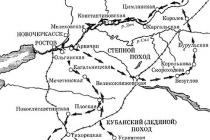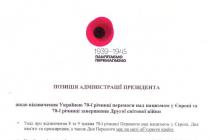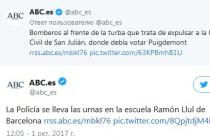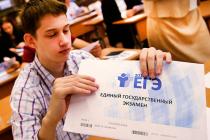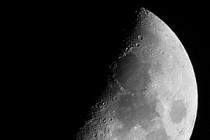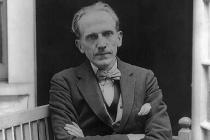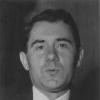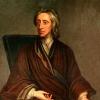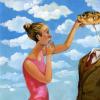October 7th, 2016

As I remember now, we are sitting on chairs in a children's sanatorium and the radio says "The General Secretary of the USSR Konstantin Chernenko has died," and then we laugh as the whole group. We just had a boy in our group - Chernenko.
How much do you know about this Secretary General? They write a lot about Brezhnev, Andropov, Khrushchev. But this one ... let's find out something more.
In February 1984, Soviet citizens experienced mixed feelings - some felt embarrassed, others were openly having fun. 72-year-old Konstantin Chernenko was elected the new General Secretary of the CPSU Central Committee instead of 69-year-old Yuri Andropov, who died from a serious illness. The new Soviet leader was also seriously ill, and looking at him appearance, the inhabitants of the Land of the Soviets said: the new funeral will not be long.
The forecast turned out to be correct: Chernenko's reign lasted a little over a year, and even this period the leader was mostly in a hospital bed.
In this sense, the late USSR resembled the Vatican: just as Catholic hierarchs sometimes choose an elder as a temporary compromise figure as a pontiff, representatives of the Soviet party elite chose the sick Chernenko so that for some time he would be a screen for a furious struggle for power hidden from the eyes.
Konstantin Chernenko himself was not eager to become a leader. All his life he was a skillful and diligent performer who, at the end of his life, suddenly found himself at the very top.
Ukrainian from Siberia
It is all the more surprising that the biography of this Soviet secretary general has perhaps the largest number of "white spots". Chernenko himself created the "spots", taking advantage of his official position. As head of the General Department of the Central Committee of the CPSU in the 1960s, he gained access to the most important party secrets, including the biographies of the leaders.
Having established the strictest system of access to work with archive documents, Chernenko tried to make sure that the most controversial and controversial pages of his own biography would disappear from his array forever.
He was born on September 24, 1911 in the village of Bolshaya Tes, Yenisei province. His father, Ustin Demidovich Chernenko, came from a family of Ukrainian peasants who had moved to Siberia. My father worked in copper mines and gold mines.
Many years later, when Chernenko has already entered the top leadership of the USSR, his native village will be flooded during the creation of the Krasnoyarsk reservoir.
Chernenko had quite a lot of relatives and, having become a "big man", he helped them get a job in "bread" places. However, unlike the riotous lifestyle of Brezhnev's daughter, Chernenko's relatives, like himself, skillfully remained in the shadows, without causing irritation.
The career of a functionary could be ruined by women
In his youth, Kostya Chernenko graduated from a three-year school for rural youth, after which he began a party career. At the age of 18 he became the head of the agitation and propaganda department of the district committee of the Komsomol. Then he served in the border troops, where he distinguished himself both in the liquidation of a dangerous gang and in his main "specialty" as an agitator-propagandist. During his service, Chernenko joined the party and became the secretary of the party organization of the border detachment.
Returning from the army, the 22-year-old young man was determined to continue the party career that had begun so successfully.
By the beginning of the war, Chernenko had grown to the secretary of the Krasnoyarsk Regional Committee of the CPSU (b), and in the midst of the war he was sent to the Higher School of Party Organizers under the Central Committee of the CPSU (b). After graduation, the functionary was sent to work in Penza. In 1948, in Moscow, they intended to take him to work in the central office.
And here my career failed. A letter came to Moscow from a certain woman who claimed that Chernenko was an immoral person living in several families at once. Subsequently, Chernenko tried to hide all the documents related to the party check on this fact as deeply as possible or to destroy it altogether.
It is known, however, that party comrades came to the conclusion that certain facts discrediting Konstantin Ustinovich took place. This did not completely destroy his career, but instead of Moscow, he ended up in Chisinau, taking the post of head of the propaganda and agitation department of the Central Committee of the Communist Party of Moldova.
Exemplary performer
Two years later, Leonid Brezhnev became the First Secretary of the Central Committee of the Communist Party of Moldova. Acquaintance with him, which grew into friendship, became fateful for Chernenko. It is not known if this was due to the fact that both experienced increased cravings in their youth. female sex, but it is reliably known that Brezhnev very quickly appreciated Chernenko's skills as a performer and organizer. Moving upstairs, Leonid Ilyich will drag his friend along with him.
In 1956, Chernenko still got a job in Moscow, becoming the head of the mass agitation sector in the propaganda and agitation department of the CPSU Central Committee. In 1960, Leonid Brezhnev became chairman of the Presidium of the Supreme Soviet of the USSR, and Chernenko was appointed head of the Presidium Secretariat.
In 1965, after Brezhnev became “the number one man” in the USSR, Chernenko was appointed head of the General Department of the CPSU Central Committee.
It is difficult to call it “ right hand"Brezhnev - for this role he was too invisible and unambitious. But it depended on Chernenko how quickly this or that issue would be resolved, and what kind of decision could be made. In his hands was all the correspondence of the secretary general, he prepared draft answers, materials for meetings of the Politburo and much more. Over time, Chernenko de facto himself began to make decisions on many issues, only bringing a ready-made verdict for approval to Brezhnev. However, this did not concern key issues - Chernenko never crossed the border.
Since the second half of the 1970s, when Brezhnev's health began to deteriorate, "friend Kostya" became an indispensable person for him. In 1978 he was inducted into the ranks of the country's top leaders, becoming a member of the Politburo of the CPSU Central Committee.
At the same time, part of the party elite began to view him as a possible successor to Brezhnev, in opposition to another group that supported Yuri Andropov.
In November 1982, when Brezhnev died, Andropov's supporters took over, Chernenko personally announced the candidacy of the ex-chairman of the USSR KGB for the post of general secretary at the Plenum of the CPSU Central Committee. The proposal was adopted unanimously.
And on February 13, 1984, Chernenko himself, after Andropov's death, was approved for the post of general secretary.
Year of Secretary General Chernenko: boycott of the Olympics, school reform and persecution of rockers
As already mentioned, by this time he was seriously ill. However, during the short period of his reign, some significant things have happened. A school reform was launched, which provided, in particular, for education from the age of 6 and the introduction of a five-day school.
Chernenko, who, while working in Moldova, graduated from the Pedagogical Institute, was generally actively interested in education issues - it was during his time that the Day of Knowledge holiday appeared.
Under Chernenko, a response was given to the American boycott of the 1980 Olympics in Moscow - the USSR national team refused to participate in the Games in Los Angeles, and as an alternative to them, large-scale competitions "Friendship-84" were organized.
Chernenko launched a campaign to combat music groups causing "ideological and aesthetic damage." This period became the time of the most severe pressure in relation to the representatives of "Russian rock".
Contrary to the misconception, the investigation of large corruption cases begun under Andropov was not curtailed under Chernenko. The former head of the USSR Ministry of Internal Affairs Nikolai Shchelokov was stripped of the rank of general of the army, state awards and expelled from the party during the reign of Konstantin Ustinovich.
Chernenko was a supporter of the party rehabilitation of Stalin, but he failed to carry out this project. But he reinstated the famous figure of the Stalinist era, Vyacheslav Molotov, in the party. This step in relation to the 94-year-old Molotov will give rise to an anecdote: "Chernenko found himself a successor."
All jokes, but the mighty Stalinist People's Commissar for Foreign Affairs and the head of the Soviet government will outlive Chernenko, ending his earthly journey already in the era of perestroika.
The last election of a dying man
In the mid-1970s, the Soviet leadership was struck by an epidemic of mutual awards, which also affected Chernenko. Under Brezhnev, he became twice Hero of Socialist Labor, and he received the third "Gold Star" in 1984, on his last birthday.
In February 1985, elections to the Supreme Soviet of the RSFSR were held, and the first person of the state, according to tradition, was nominated for deputy by labor collectives. Chernenko did not leave the ward at the Central Clinical Hospital, and everyone understood that he was living out last days... Nevertheless, the scenery of the polling station was created right in the chamber in order to show the people the participation of the secretary general in an important state event.
On February 28, 1985, the Vremya program showed the ceremony of presenting Chernenko with a deputy's certificate. This broadcast made a depressing impression - the leader of the country was gasping for breath, spoke with difficulty and practically did not stand on his feet without the help of strangers. Against this background, even Brezhnev in last years seemed a cheerful big man.
We must pay tribute to Konstantin Chernenko - the party functionary to the last played the role to which he devoted his whole life, even tried to talk about the need for new labor achievements. However, the country, listening to him, was preparing for the next series of the epic known as "carriage races".
The "Ku" problem
Konstantin Chernenko died on March 10, 1985 at 19:20 Moscow time. Three days later, he became the last one to be buried at the Kremlin wall.
The secretary general never found out what role he played in the fate of the comedy "Kin-dza-dza!", Which has now become a classic of Russian cinema. The fact is that Chernenko came to power in the midst of work on the tape, stumping the creators: the main word of the aliens "ku" coincided with the initials of the secretary general - Konstantin Ustinovich. Fearing trouble, Georgy Danelia and Rezo Gabriadze decided to replace "ku" with something else, but none of the options seemed appropriate. While the issue of replacement was being resolved, Chernenko was gone, and the film remained unchanged. So the "ku" in this comedy is also the memory of the strangest leader of the Soviet era.
sources
In February 1984, Soviet citizens experienced mixed feelings - some felt embarrassed, others were openly having fun. The new General Secretary of the CPSU Central Committee instead of the 69-year-old who died from a serious illness Yuri Andropov was elected 72 year old Konstantin Chernenko... The new Soviet leader was also seriously ill, and, looking at his appearance, the inhabitants of the Land of the Soviets said: a new funeral will not be long.
The forecast turned out to be correct: Chernenko's reign lasted a little over a year, and even this period the leader was mostly in a hospital bed.
In this sense, the late USSR resembled the Vatican: just as Catholic hierarchs sometimes choose an elder as a temporary compromise figure as a pontiff, representatives of the Soviet party elite chose the sick Chernenko so that for some time he would be a screen for a furious struggle for power hidden from the eyes.
Konstantin Chernenko himself was not eager to become a leader. All his life he was a skillful and diligent performer who, at the end of his life, suddenly found himself at the very top.
Ukrainian from Siberia
It is all the more surprising that the biography of this Soviet secretary general has perhaps the largest number of "white spots". Chernenko himself created the "spots", taking advantage of his official position. As head of the General Department of the Central Committee of the CPSU in the 1960s, he gained access to the most important party secrets, including the biographies of the leaders.
Having established the strictest system of access to work with archive documents, Chernenko tried to make sure that the most controversial and controversial pages of his own biography would disappear from his array forever.
He was born on September 24, 1911 in the village of Bolshaya Tes, Yenisei province. His father, Ustin Demidovich Chernenko, came from a family of Ukrainian peasants who moved to Siberia. My father worked in copper mines and gold mines.
Many years later, when Chernenko has already entered the top leadership of the USSR, his native village will be flooded during the creation of the Krasnoyarsk reservoir.
Chernenko had quite a lot of relatives and, having become a "big man", he helped them get a job in "bread" places. However, unlike the daughter's riotous lifestyle Brezhnev, Chernenko's relatives, like himself, skillfully remained in the shadows, without causing irritation.
The career of a functionary could be ruined by women
In his youth, Kostya Chernenko graduated from a three-year school for rural youth, after which he began a party career. At the age of 18 he became the head of the agitation and propaganda department of the district committee of the Komsomol. Then he served in the border troops, where he distinguished himself both in the liquidation of a dangerous gang and in his main "specialty" as an agitator-propagandist. During his service, Chernenko joined the party and became the secretary of the party organization of the border detachment.
Returning from the army, the 22-year-old young man was determined to continue the party career that had begun so successfully.
Konstantin Chernenko (second from the right in the top row) among the delegates of the party conference of the border detachment. 1932 year. Photo: RIA Novosti
By the beginning of the war, Chernenko had grown to the secretary of the Krasnoyarsk Regional Committee of the CPSU (b), and in the midst of the war he was sent to the Higher School of Party Organizers under the Central Committee of the CPSU (b). After graduation, the functionary was sent to work in Penza. In 1948, in Moscow, they intended to take him to work in the central office.
And here my career failed. A letter came to Moscow from a certain woman who claimed that Chernenko was an immoral person living in several families at once. Subsequently, Chernenko tried to hide all the documents related to the party check on this fact as deeply as possible or to destroy it altogether.
It is known, however, that party comrades came to the conclusion that certain facts discrediting Konstantin Ustinovich took place. This did not completely destroy his career, but instead of Moscow, he ended up in Chisinau, taking the post of head of the propaganda and agitation department of the Central Committee of the Communist Party of Moldova.

Konstantin Chernenko, 1976. Photo: RIA Novosti / Filatov
Exemplary performer
Two years later, he became the First Secretary of the Central Committee of the Communist Party of Moldova Leonid Brezhnev... Acquaintance with him, which grew into friendship, became fateful for Chernenko. It is not known whether the fact that both in their youth experienced an increased attraction to the female sex played a role, but it is reliably known that Brezhnev very quickly appreciated Chernenko's skills as a performer and organizer. Moving upstairs, Leonid Ilyich will drag his friend along with him.
In 1956, Chernenko still got a job in Moscow, becoming the head of the mass agitation sector in the propaganda and agitation department of the CPSU Central Committee. In 1960, Leonid Brezhnev became chairman of the Presidium of the Supreme Soviet of the USSR, and Chernenko was appointed head of the Presidium Secretariat.
In 1965, after Brezhnev became “the number one man” in the USSR, Chernenko was appointed head of the General Department of the CPSU Central Committee.
It is difficult to call him Brezhnev's "right hand" - for this role, he was too invisible and unambitious. But it depended on Chernenko how quickly this or that issue would be resolved, and what kind of decision could be made. In his hands was all the correspondence of the secretary general, he prepared draft answers, materials for meetings of the Politburo and much more. Over time, Chernenko de facto himself began to make decisions on many issues, only bringing a ready-made verdict for approval to Brezhnev. However, this did not concern key issues - Chernenko never crossed the border.
Since the second half of the 1970s, when Brezhnev's health began to deteriorate, "friend Kostya" became an indispensable person for him. In 1978 he was inducted into the ranks of the country's top leaders, becoming a member of the Politburo of the CPSU Central Committee.

Soviet delegation at the Conference on Security and Cooperation in Europe: Leonid Brezhnev, Andrei Gromyko and Konstantin Chernenko, 1975. Photo: RIA Novosti / O. Ivanov
At the same time, part of the party elite began to view him as a possible successor to Brezhnev, in opposition to another group that supported Yuri Andropov.
In November 1982, when Brezhnev died, Andropov's supporters took over, Chernenko personally announced the candidacy of the ex-chairman of the USSR KGB for the post of general secretary at the Plenum of the CPSU Central Committee. The proposal was adopted unanimously.
And on February 13, 1984, Chernenko himself, after Andropov's death, was approved for the post of general secretary.
Year of Secretary General Chernenko: boycott of the Olympics, school reform and persecution of rockers
As already mentioned, by this time he was seriously ill. However, during the short period of his reign, some significant things have happened. A school reform was launched, which provided, in particular, for education from the age of 6 and the introduction of a five-day school.
Chernenko, who, while working in Moldova, graduated from the Pedagogical Institute, was generally actively interested in education issues - it was during his time that the Day of Knowledge holiday appeared.
Under Chernenko, a response was given to the American boycott of the 1980 Olympics in Moscow - the USSR national team refused to participate in the Games in Los Angeles, and as an alternative to them, large-scale competitions "Friendship-84" were organized.
Chernenko launched a campaign to combat musical groups that inflict "ideological and aesthetic damage." This period became the time of the most severe pressure in relation to the representatives of "Russian rock".
Contrary to the misconception, the investigation of large corruption cases begun under Andropov was not curtailed under Chernenko. Former head of the USSR Ministry of Internal Affairs Nikolay Shchelokov stripped of the rank of army general, state awards and expelled from the party during the reign of Konstantin Ustinovich.
Chernenko was a supporter of party rehabilitation Stalin, however, he failed to carry out this project. But he reinstated the famous figure of the Stalin era in the party Vyacheslav Molotov... This step in relation to the 94-year-old Molotov will give rise to an anecdote: "Chernenko found himself a successor."
All jokes, but the mighty Stalinist People's Commissar for Foreign Affairs and the head of the Soviet government will outlive Chernenko, ending his earthly journey already in the era of perestroika.

Honor guard at the grave of K.U. Chernenko on Red Square near the Kremlin Wall. Photo: RIA Novosti / Alexander Makarov
The last election of a dying man
In the mid-1970s, the Soviet leadership was struck by an epidemic of mutual awards, which also affected Chernenko. Under Brezhnev, he became twice Hero of Socialist Labor, and he received the third "Gold Star" in 1984, on his last birthday.
In February 1985, elections to the Supreme Soviet of the RSFSR were held, and the first person of the state, according to tradition, was nominated for deputy by labor collectives. Chernenko did not leave the ward at the Central Clinical Hospital, and everyone understood that he was living out his last days. Nevertheless, the scenery of the polling station was created right in the chamber in order to show the people the participation of the secretary general in an important state event.
On February 28, 1985, the Vremya program showed the ceremony of presenting Chernenko with a deputy's certificate. This broadcast made a depressing impression - the leader of the country was gasping for breath, spoke with difficulty and practically did not stand on his feet without the help of strangers. Against this background, even Brezhnev in recent years seemed to be a vigorous big man.
We must pay tribute to Konstantin Chernenko - the party functionary to the last played the role to which he devoted his whole life, even tried to talk about the need for new labor achievements. However, the country, listening to him, was preparing for the next series of the epic known as "carriage races".
The "Ku" problem
Konstantin Chernenko died on March 10, 1985 at 19:20 Moscow time. Three days later, he became the last one to be buried at the Kremlin wall.
The secretary general never found out what role he played in the fate of the comedy "Kin-dza-dza!", Which has now become a classic of Russian cinema. The fact is that Chernenko came to power in the midst of work on the tape, stumping the creators: the main word of the aliens "ku" coincided with the initials of the secretary general - Konstantin Ustinovich. Fearing trouble George Danelia and Rezo Gabriadze decided to replace "ku" with something else, but none of the options seemed appropriate. While the issue of replacement was being resolved, Chernenko was gone, and the film remained unchanged. So the "ku" in this comedy is also the memory of the strangest leader of the Soviet era.
Everyone knows that the only chapter Soviet Union, who fought at the front in the Great Patriotic War, was L.I. Brezhnev. N. Khrushchev, Y. Andropov and K. Chernenko were also allowed to go to defend their homeland with arms in hand - but they had a different fate. Let's see what the heads of the Soviet state were doing instead of fighting alongside the entire Soviet people.
Khrushchev
In 1941, Nikita Sergeevich Khrushchev turned 47 years old. At that time, he was a member of the Central Committee of the CPSU and the first secretary of the Central Committee of the Communist Party of Ukraine, that is, in fact, the head of this union republic. In those days, he was known as a communist very devoted to I. Stalin, who obediently implemented a repressive policy. When the war broke out, he became military commissar for five fronts in the southern, southwestern and western directions. Simply put, he was a senior staff officer. That is, he participated in the war, but as a commander, not a fighter. Note that Khrushchev already had combat experience - during Civil war he led a detachment of the Red Guard, and then was an instructor in the army's political department.
However, to all appearances, this experience was clearly not enough. His activity as a military commissar is assessed rather negatively. He was directly related to the two major defeats of the Soviet army - the encirclement of Soviet troops near Kiev in 1941 and the unsuccessful battles near Kharkov in 1942.
Khrushchev's role in the Kiev tragedy is controversial. Many accuse him of the fact that the Soviet troops, which did not receive the order to retreat, were surrounded. However, it is not. Khrushchev just gave such an order, and without consulting Stalin. But due to the fact that the decision was not agreed with the rate, it did not enter into force and did not reach the troops.
In 1942, the Soviet army was defeated near Kharkov, and the Germans pushed the front line towards the Caucasus. Our units were ordered to resist to the end, although it was obvious that due to the lack of resources, the city would not be able to hold. As a result, we suffered heavy losses, while the Germans were able to take positions that were more profitable than those that they would have got if the defenders of Kharkov retreated. Here, too, there was a mistake made by the Soviet command, which is often attributed to Khrushchev. However, it was not done by him personally, but by the collective military council.
Andropov
Yuri Vladimirovich Andropov, who headed the USSR from 1982 to 1984, was 27 years old in 1941. At this time, he, a Komsomol activist, was organizing the work of the Komsomol in the territories of the newly formed Karelo-Finnish ASSR. About his war period, the official biographies of Andropov report briefly: at the beginning of the war, he organized a partisan underground, from 1942 to 1944, under the call sign Mohican, he was engaged in the formation of a Komsomol underground in Karelia occupied by the Germans and Finns. In the book by Yu. Shleikin "Andropov. Karelia. 1940-1951." provides documentary evidence of Andropov's partisan activities. For example, here is a fragment of the memoirs of the partisan Silva Udaltsova:
"In July 1943, together with a group of comrades, they summoned me to the Central Committee of the Communist Party of the KFSSR and set us the task: to penetrate the territory of the occupied Sheltozero region, create an underground party and Komsomol organization, establish strong ties with the local population, among which to develop political work aimed at disrupting the activities carried out by the occupation authorities, reporting the necessary intelligence data to the Center.
... Before us, liaisons of the Central Committee of the Party of the Republic Anna Lisitsyna and Maria Melentieva, who were later awarded the title of Hero of the Soviet Union for courage and bravery, have visited Sheltozero. I.I. was sent and worked in Sheltozero. Zinoviev and a number of other comrades. However, it was not possible to establish permanent work of the underground for a long period. Our group included: D.M. Gorbachev - secretary of the underground district party committee, P.I. Udaltsov is the secretary of the underground district committee of the Komsomol, MF Asanov is the liaison and I am the radio operator of the group. When I was appointed radio operator, I had just turned 19 years old.
Yu.V. Andropov, secretary of the Central Committee of the Komsomol of our republic. We flew to the rear on four U-2 aircraft. Yuri Vladimirovich approached each group, standing by the plane, and spoke parting words again. "
Chernenko
Konstantin Ustinovich, "the strangest ruler of Russia," became General Secretary in 1984, being a decrepit and sick old man.
Chernenko was born into a Siberian family, grew up a strong guy. His mother was Tofalark, and his father was Ukrainian. From his youth, Konstantin was accustomed to hard work, worked in the mines. In the 1930s, he was drafted into the army, where he joined the Komsomol, deciding to become an activist. In 1941 he turned 30. By this time, he was also already an accomplished party leader - the head of the agitation and propaganda department of two district committees of the CPSU (b) in the Krasnoyarsk Territory. In 1943 he was sent to party courses in Moscow, which he graduated in 1945. It is worth noting that in itself his then position was low and did not exempt him from military duty. Apparently, not to get to the front strong young man helped by his sister, who worked as the head of the organizational department of the Krasnoyarsk city committee and was good relationship with Averkiy Aristov, who headed the Krasnoyarsk Territory.
Good afternoon, dear readers!
This time we will consider brief description activities of Andropov Yu.V. and K. Chernenko. Their time of "reign" was very short and was not marked by any grandiose events and changes, but, nevertheless, it is necessary to consider their small role in the history of our Fatherland.
It is worth saying that both figures also relate to the concept of "gerontocracy" in the Soviet period. Andropov became in the gravel of the country at the age of 68, Chernenko at the age of 73, and both ceased their activities due to death.
Yu.V. Andropov became General Secretary of the CPSU Central Committee in November 1982. From the very beginning of his activity as the head of the Union, he began to act actively. In his reports and works, he spoke positively about the work of the previous General Secretary (Brezhnev) and pointed out his plans to continue state work in the same direction, but with greater zeal. "Labor productivity is growing at a rate that cannot satisfy us," Andropov emphasized in one of his reports. In order to stimulate lazy Soviet society to productive work, he took the following measures:
- Made a personnel reshuffle in the "top" of the party
- He announced the beginning of an intensified fight against corruption, which bred due to Brezhnev's conniving attitude (soon the fight against this type of crime subsided)
- Strengthened measures to strengthen discipline (catching latecomers walking the streets and shops during working hours, etc.)
- In June 1983, the law "On labor collectives and increasing their role in the management of enterprises, institutions, organizations" was adopted (but the law remained nominal, since command-and-control methods of management remained a priority in the economy)
Konstantin Ustinovich was already sick at that time. He was distinguished by a gentle character and indecision, was an ideal candidate for an "intermediate figure." The new leader continued his activities in line with the previous head of government. At the end of 1984, the program “To the level of the requirements of developed socialism. Some Actual Problems of Theory, Strategy and Tactics of the CPSU ”, in which the lagging behind of the USSR from the capitalist countries was noted, and a directive was given to improve socialism and raise the country's economy. During his short tenure as General Secretary of the CPSU Central Committee, he tried to fight the shadow economy, start a policy of acceleration and undertake some reforms. It is worth noting that it was under Chernenko in 1984 that our beloved Day of Knowledge (September 1) was introduced by all of us. Also under him, the Union team refused to take part in the 1984 Olympics, held in Los Angeles, in response to the boycott of America in 1980.
On February 10, 1985, Chernenko died of cardiac arrest. His departure marked the end of the era of the reign of the elders; a young and energetic Gorbachev was appointed in his place.
After Leonid Ilyich Brezhnev died, the post of the first secretary of the central committee communist party took Yu.V. Andropov. The views of this manager were very moderate. Politics Yu.V. Andropova said that over the years the country has accumulated a huge number of unsolved problems that require immediate resolution. The support of the party and the majority of officials by Yu.V. Andropov got it because he was not talking about cardinal changes in the country, but only about those minimal changes that cause the greatest anger in society. The reforms that Yu.V. Andropov, were met with understanding by the people. Andropov did not have time to realize these plans. He died in February 1984.
K.U. Chernenko
The CPSU Central Committee was headed by K.U. Chernenko. He sought to cleanse the party of negativity, but it was during the years of K.U. Chernenko's disintegration of the party only intensified. But this is not the direct fault of the Secretary General. K.U. Chernenko was very sick and was of old age. He spent more time in hospitals, spas and treatment. At this time, M.S. Gorbachev, who began to rule the country from March 10, 1985, after the death of K.U. Chernenko.
The plenum of the CPSU Central Committee, which took place in January 1987, recognized the need for new personnel for the country. To this end, a massive rejuvenation of the party began. Both local and higher authorities were exposed to this phenomenon. But the problems in the country were much deeper, the situation could not be solved simply by rejuvenating the managers. In 1988, a regular party congress took place, at which it was decided to change the electoral system in the country. In the spring of 1989, the first "democratic" elections took place. M.S. became the chairman of the government formed as a result of the elections. Gorbachev.
During the years of perestroika, the USSR made the transition to a multi-party system. Starting in 1988, the first opposition parties began to appear in the USSR. The changes also affected the CPSU itself. The party was sharply divided into several streams. Three wings were formed: traditional, moderate renovation and radical. As a result of the contradictions, the authority of the CPSU was undermined. People began to leave the ranks of the party en masse. Between 1986 and 1991, about 15 million people left the CPSU. As a result, M.S. Gorbachev began to rapidly lose his position.
On March 11, 1990, Lithuania, the first of the union republics, declared its independence. This threatened the very existence of the USSR. In response to this, tough measures were taken against Lithuania to blockade the country. Additional troops were brought into Lithuania. However, by the summer of 1991, almost all union republics had declared their independence. M.S. Gorbachev was in a hurry to create a new union treaty. The representatives of the republics were supposed to sign this agreement on August 20. On August 19, the GKChP body was created, whose functions were to stabilize the situation in the country. However, the democratic forces in the country declared this body illegal and called on people to take to the streets to protest. On August 21, an emergency congress of the Supreme Soviet was convened, which declared the illegality of the actions of the State Emergency Committee, whose representatives were arrested. These events finally undermined the faith in power. All union republics refused to sign the union treaty.
In December 1991, three people ceased to exist in the USSR. Representatives of Russia, Ukraine and Belarus signed an act that invalidated the union treaty of 1922. The USSR ceased to exist, it was replaced by the CIS (Union of Independent States). All union republics, except for Georgia and the Baltic states, were included in the CIS. This meant the end of the existence of the USSR. Immediately after these events, M.S. Gorbachev resigned.
During the years of perestroika, the leaders of the USSR planned to reform the country, but made a mistake with the methods of reform.

